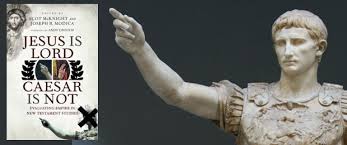AN INTERVIEW WITH SCOT MCKNIGHT
Ben: It appears that the purpose of this book was to offer a certain tempering of the recent rhetoric about the anti-imperial rhetoric found in the NT? Yes?
Yes, in part, but only because both Joe and I thought the entire issue was getting out of hand. We didn’t, however, actually know all that much about what the individual authors in the volume thought about all the issues. We wanted an even-handed analysis of the evidence being used for anti-imperial rhetoric found in the NT. When a study like Walsh-Keesmaat can get the kind of naïve acceptance we saw among some we thought there was a reason to give the whole theme a new look. Joe and I each, independently, had already observed that this theme was too often concerned with Bush, and we have seen a noticeable absence of the theme in the Obama years. Ironically, Brian Walsh at the IBR meeting asked a public question: “Have you learned nothing from Bush?” It was to me an obvious slip of admitting the Bush years shaped what they were seeing in Colossians.
B: Perhaps you and I are just getting old, but on the surface of things it appears you deliberately chose mostly young scholars, one even not finished with dissertation, to write this volume. Why that decision, and what benefits do you think it brought to the table?
Joe had asked a few; I asked a few; Joel Willitts as a colleague and friend suggested a few names to me of folks who had touched on such themes in various authors of the New Testament. I don’t recall having a conversation to ask younger scholars, but I am committed (as you can see in the Story of God Bible Commentary) to enlist the younger scholars when we can. I am grateful that a few publishers stuck their neck out for me when I was young and so I’ve had a bent toward gathering the next generation’s scholars into projects when possible.
Plus, is there any doubt what some of us older rank professors would think about such topics?
B: One of the things that did surprise me about the book is that the sovereignty of God hardly came up. By this I mean, that traditionally Jews who often suffered from the empires of the ANE would respond to such not with anti-imperial rhetoric, but rather by assuring the faithful that despite appearances to the contrary, God was still in charge of the world, and after all empires rise and fall, and God’s reign would endure and out last them. In other words, I don’t see much discussion about how the Kingdom of God language in the NT should have relativized or minimized even the felt need for sharp Empire criticism on the part of the NT authors. Did this surprise you when you read and edited these essays?
Ben, this is a good point. As I think through the essays the categories were established by what the empire critics were using to prove their points, and I don’t recall that being much of a topic among the empire critics. In fact, their leanings are toward activism if not rebellion. So, instead of offering a positive counter-proposal, which would surely include God’s sovereignty over history (as we see so forcefully in Tom Wright’s Paul books as he has updated his own empire criticism, which I see as an improvement of his older version), our authors addressed the critics and how they were framing the topics. The same applies to kingdom of God – had the topic been what the NT actually says when it comes to the nations and empires, that would have come up (I would hope).
B: From time to time in these essays the issue of hidden scripts, or coded language comes up, with the verdict being sort of yes and no when one applies that idea to the NT. Yes, in the case of an apocalyptic book like Revelation, but no in general, not least because the NT documents were not public documents, not broadsheets nailed to a post in the agora, they were insider literature, with little need or motive for insider language. After you read these essays, did your views on this issue change, or remain the same, and in either case—- Why?
Hidden scripts… that was one theme I would like to have seen more theoretical attention to. There is a new research (by Christoph Heilig) addressing the methodological issue of discovering hidden scripts that will take this entire issue to a new level – using some sophisticated mathematics! This is probably the most irritating feature of the empire critics, and the argument often goes like this: “If you knew Roman or Greek sources, as I know and can’t detail here extensively, you’d know this language in [insert NT author] is profoundly anti-empire and subversive.” Well, the odd thing for me is that every time Paul actually mentions Rome he’s positive, and I don’t think Paul was a cowering, fearful speaker. He’d have thumped Caesar in the nose had he wanted to. The hidden subversions of Romans 13 have never convinced me.
B: One of the more constant themes in these essays is that monotheists of course could not abide any kind of idolatry, which of course included the emperor cult, but that it does not seem that many or most of the NT documents single out the new cult on the block, the Emperor cult, for special criticism. Would you agree?
Yes, I agree with this. The impression I get from our essayists is that the authors of the NT were not as concerned with Rome’s power and Rome’s religion near as much as some think. What we do see is the Roman power ideology under withering critique in the Pauline ethical stances, not least being the cross and denying one’s status. Joe Hellerman’s two books on this theme are outstanding displays of Paul cutting into Roman power ideologies, but I see very little direct address to the issues of imperial worship. It is in Acts, clearly, and Kavin Rowe has helped us all here, but as an overall immediate implication of kingdom or Lord, I’m not so sure.
Scot: Ben, a question back to you: I grew up in this field reading JB Lightfoot, BF Wescott, and FF Bruce, and while they were brilliantly aware of the Roman ideologies and Caesar’s reach, I don’t recall their making much of Paul or John or Peter, or Jesus, having an agenda against the Roman imperial worship and ideology. I did grow up knowing that calling Jesus “Lord” had some potency in that world, but I don’t recall their making a big deal of this. If I’m right in this description, then those who were most familiar with this literature – far more than most empire critics today – did not see all that is being seen today.
B: I completely agree, and these new volumes on Lightfoot I’m publishing just further that point. There is nothing said about it at all, even when we get to John 1 and the calling of Jesus God, Lord, and Savior. Nothing.
B: Finally, for a somewhat more probing question, the presentation of government and a Christian’s relationship to government in the NT is varied. When the pagan government becomes idolatrous or abusive or engages in over-reach, then there is criticism, even sharp criticism that governments and rulers can become the tools of the demonic, agents of evil. This we see rather clearly in Revelation. But when that government is not behaving in this manner, we tend to hear things like ‘obey the governing officials’ and ‘all governing officials (even Nero apparently in Romans) have authority and power which devolves from God’ or ‘pay your taxes’. What do you make of this variety of responses to government in the NT? It seems that the specifics of the social situation determines what is said about the matter.
I totally agree. The earliest Christians were so miniscule they simply did not have designs on the empire. They knew the overwhelming power of the Roman empire and Caesar and his various representatives; they knew the way to get along was to be good (1 Peter). When Rome demanded too much, they went with God. Otherwise, they saw Rome as the pagan empire and someday coming down under the good hand of God’s judgment, but in the meantime they were to be good people and be gospelers. Their politics was the church. So the positives are probably as much pragmatics as they were theory.












